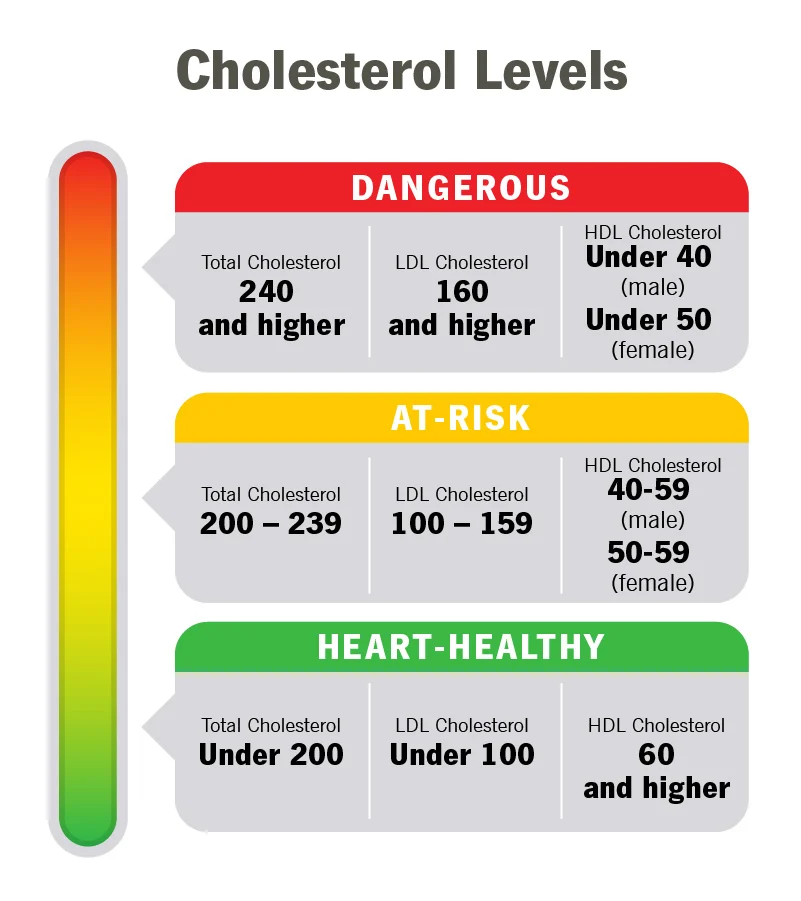What’s Low Density Lipoprotein?
LDL cholesterol, or low-density lipoprotein cholesterol, is a type of lipoprotein that carries cholesterol from the liver to the cells throughout the body. While cholesterol is essential for various bodily functions, including hormone production and cell membrane structure, high levels of LDL cholesterol can lead to the buildup of plaque in the arteries, increasing the risk of heart disease and stroke. Thus, LDL cholesterol is often referred to as “bad” cholesterol, contrasting with HDL (high-density lipoprotein) cholesterol, which is considered “good” because it helps remove LDL cholesterol from the bloodstream. Keeping LDL cholesterol levels within a healthy range is crucial for cardiovascular health.
What elevates the Low Density Lipoprotein?
Several factors can elevate LDL cholesterol levels:
- Diet: consuming foods high in saturated and trans fats, such as red meat, full-fat dairy products, fried foods, and processed snacks, can increase LDL cholesterol levels.
- Obesity: being overweight or obese can lead to higher LDL cholesterol levels.
- Lack of physical activity: sedentary lifestyles can contribute to elevated LDL cholesterol levels and lower HDL cholesterol levels.
- Genetics: some individuals may have genetic factors that predispose them to higher LDL cholesterol levels, such as familial hypercholesterolemia.
- Smoking: tobacco smoke contains chemicals that can damage blood vessels and lead to higher LDL cholesterol levels.
- Certain medical conditions: conditions such as diabetes, hypothyroidism, and kidney disease can affect cholesterol metabolism and lead to higher LDL cholesterol levels.
- Medications: certain medications, such as corticosteroids, some diuretics, and certain immunosuppressants, can elevate LDL cholesterol levels.
Managing LDL cholesterol levels typically involves a combination of lifestyle changes (such as diet and exercise) and, in some cases, medications like statins to lower cholesterol levels and reduce the risk of cardiovascular disease. Regular monitoring and management of LDL cholesterol levels are essential for maintaining cardiovascular health.
What is the normal LDL cholesterol range?
The recommended LDL cholesterol levels can vary slightly depending on individual risk factors and health guidelines. However, generally speaking, the following ranges are commonly used:
| Optimal: | Less than 100 mg/dL (2.6 mmol/L) |
| Near optimal/above optimal: | 100-129 mg/dL (2.6-3.3 mmol/L) |
| Borderline high: | 130-159 mg/dL (3.4-4.1 mmol/L) |
| High: | 160-189 mg/dL (4.1-4.9 mmol/L) |
| Very high: | 190 mg/dL (4.9 mmol/L) and above |
However, it’s important to note that these are general guidelines, and individual recommendations may vary based on factors such as existing cardiovascular risk factors, personal medical history, and overall health status. It’s always best to consult with a healthcare professional for personalized guidance on managing cholesterol levels and reducing cardiovascular risk.
How can I know what my LDL level is?
Healthcare providers check your cholesterol levels through a simple blood test called a lipid panel. When you receive your results, it’s important to talk to your provider about what your cholesterol numbers mean.
Likewise, we present you a table where you can know what the numbers in your results mean:

Is your high cholesterol level increasing your risk of having a major cardiovascular event?
Contact our team to get an estimate of your 10-year cardiovascular risk. We will use the American College of Cardiology calculator which is a validated tool available here: https://tools.acc.org/ascvd-risk-estimator-plus/#!/calculate/estimate/
If your risk is high, request information about the Victorion-1 Prevent study.
Participating in a clinical trial is a great way to learn about your own health while possibly receiving medical attention and helping society through the advancement of medicine.


15 Responses
This blog post is packed with great content!
Thanks a lot
I have been surfing online more than 3 hours today, yet I never found any interesting article like yours. It is pretty worth enough for me. In my opinion, if all web owners and bloggers made good content as you did, the web will be much more useful than ever before.
Thanks a lot for your comment, motivates us to continue
Usually I do not read article on blogs, however I would like to say that this write-up very compelled me to take a look at and do so! Your writing taste has been amazed me. Thanks, quite nice post.
Thanks 😊
Your blog is a testament to your passion for your subject matter. Your enthusiasm is infectious, and it’s clear that you put your heart and soul into every post. Keep up the fantastic work!
Thanks for your lovely words 😊
I have read some excellent stuff here Definitely value bookmarking for revisiting I wonder how much effort you put to make the sort of excellent informative website
Thank you so much
Hello i think that i saw you visited my weblog so i came to Return the favore Im trying to find things to improve my web siteI suppose its ok to use some of your ideas
My brother suggested I might like this blog He was totally right This post actually made my day You can not imagine simply how much time I had spent for this info Thanks
The visuals you included really helped make this clear. Great choice!
Thanks for your comment
Thank you for the good writeup It in fact was a amusement account it Look advanced to far added agreeable from you However how could we communicate